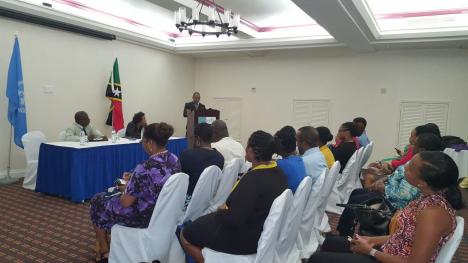 Calvin Edwards, Deputy Financial Secretary, Ministry of Finance, St Kitts and Nevis, addressing participants at a recent ECLAC training workshop. Credits: Caribbean News Now.
Calvin Edwards, Deputy Financial Secretary, Ministry of Finance, St Kitts and Nevis, addressing participants at a recent ECLAC training workshop. Credits: Caribbean News Now.
BASSETERRE, St Kitts — A recent training workshop facilitated by the Economic Commission for Latin America and the Caribbean (ECLAC) sub-regional headquarters for the Caribbean has “opened the eyes” of the ministry of finance of St Kitts and Nevis on how budgeting can be done “better”, according to Calvin Edwards, deputy financial secretary in the ministry of finance.
Nineteen senior representatives from St Kitts and Nevis’ ministries of finance, agriculture, education, health, social development, sustainable development, and public infrastructure actively participated in the training workshop that was held from 25-29 July 2016. The objective of the workshop was to build the capacity of public officials to conduct public expenditure reviews (PERs) with applications to their respective sectors.
PERs are intended to align expenditures with government’s priorities. They are also intended to generate savings, either from expenditure reallocation or by reducing unproductive expenditures. In addition they improve fiscal management and can provide fiscal space especially when a country is experiencing fiscal challenges including high public debt levels.
The workshop was timely, given that St Kitts has a large debt overhang. The initiative is also complementary to the recently launched debt for climate adaptation swaps proposal by ECLAC, which is designed to reduce the debt burden of Caribbean countries and build their fiscal resilience.
Beverly Harris, permanent secretary of the ministry of sustainable development of St Kitts and Nevis, commended ECLAC Caribbean for promoting a “consensus-building and evidence-based” approach to fiscal management in Caribbean small island developing states (SIDS), that seeks to discard the “silo mentality” that has dominated the budgeting process for so long.
In response, workshop facilitator and eminent regional economist, Professor Vanus James, commended the government of St Kitts and Nevis for taking on an adjustment strategy that fits the development needs of the country. James noted that performance based budgeting is integral to any country’s sustainable development agenda, and PERs were important to existing budgeting practices development goals.
Intervening during the high-level closing session of the training, the coordinator of ECLAC Caribbean’s Economic Development Unit, Sheldon McLean, announced that “the workshops were designed to give public officials better control of the level of spending and improve expenditure prioritization”.
In particular, McLean noted that “the degree of success achieved by utilizing PERs in the budgeting process is directly related to the level of cooperation and support provided at the highest levels of government”, and in this context underscored that public finance managers needed the support from permanent secretaries, ministers and other high level government personnel.
This workshop is part of a four-country capacity building initiative organised and financed by the UN Development Account project. Other Caribbean countries to benefit are Antigua and Barbuda, Belize and Barbados.
Following the national workshops, a regional training module in forecasting and fiscal transparency will be held at ECLAC Caribbean office in Port of Spain from 19 – 23 September 2016. The final phase of the project will include follow up technical assistance for the participating countries to support their implementation of the PER techniques.
